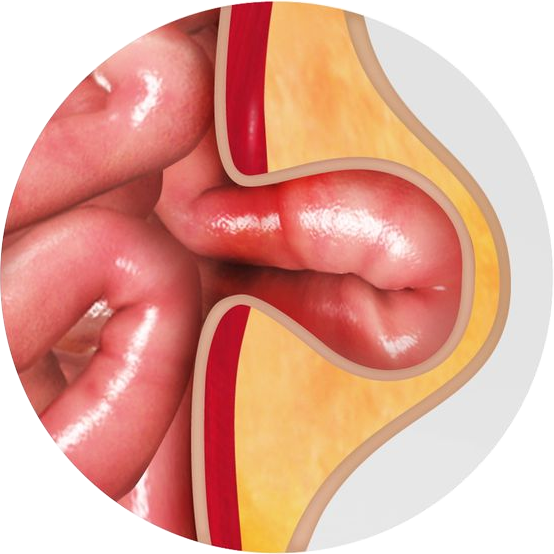Hernia in Children – Specialized Care by Dr. Prabhu Karunakaran, Pediatric Urologist in Hyderabad

A hernia occurs when an organ or tissue pushes through an abnormal opening in the body. In children, hernias are often congenital and require medical attention to prevent complications. Understanding the different types, symptoms, and treatment options can help parents seek timely intervention.
Types of Hernias in Children
- Inguinal Hernia: Occurs in the groin area when the intestine protrudes through a weak spot in the abdominal wall. More common in boys.
- Umbilical Hernia: Found near the belly button, where abdominal tissues push through a weak spot. Often closes on its own but may need surgery if it persists.
- Epigastric Hernia: Develops between the belly button and chest, caused by a gap in the abdominal muscles.
- Hiatal Hernia: Happens when part of the stomach moves into the chest cavity through the diaphragm.
Symptoms of Hernias in Children
Hernias often appear as a bulge in the affected area, which may be more visible when the child cries, coughs, or strains. Other signs include:
- A noticeable lump in the groin or belly button
- Pain or discomfort, especially during movement
- Vomiting (in severe cases)
- Redness or swelling around the bulge (may indicate a trapped hernia, requiring urgent care)
Diagnosis and Treatment
Diagnosing Hernia:
- Physical examination to check for swelling or bulges
- Ultrasound or imaging tests for confirmation
Treatment Options:
- Observation: Some umbilical hernias close naturally by age 4–5
- Hernia Repair Surgery: Recommended for inguinal and persistent umbilical hernias to prevent complications
- Laparoscopic or Open Surgery: Depending on the hernia size and location, a minimally invasive approach may be advised

Why Choose Dr. Prabhu Karunakaran for Pediatric Hernia Care?
As an experienced Pediatric Urologist in Hyderabad, Dr. Prabhu Karunakaran provides comprehensive evaluation and treatment for children with hernias. He ensures a child-friendly approach, focusing on safety, comfort, and long-term health outcomes.
Frequently Asked Questions (FAQs)
What causes hernias in children?
Most hernias in children are congenital, meaning they are present at birth due to incomplete closure of the abdominal wall or natural openings. Factors like premature birth and family history may increase the risk.
How can I tell if my child has a hernia?
Common signs include a visible bulge in the groin or belly button area, which may become more noticeable when the child cries, coughs, or strains. Your child may also show signs of discomfort or mild pain.
Are hernias dangerous in children?
While many hernias are not immediately dangerous, some can become “incarcerated” or “strangulated,” meaning the protruding tissue gets trapped and loses blood supply. This is a medical emergency and needs urgent care.
When is surgery necessary for a child’s hernia?
Surgery is typically recommended for inguinal hernias and umbilical hernias that do not close on their own by age 4–5. Prompt surgical repair helps prevent complications and ensures long-term health.
Is hernia surgery safe for children?
Yes, hernia surgery is generally safe and routinely performed by pediatric specialists. Dr. Prabhu Karunakaran uses child-friendly techniques, including minimally invasive (laparoscopic) options, to ensure a smooth and speedy recovery.
How long is the recovery after pediatric hernia surgery?
Most children recover quickly and can return to normal activities within 1 to 2 weeks. Your doctor will provide specific instructions based on your child’s age, overall health, and type of hernia repair.
Can hernias come back after surgery?
Recurrence is rare, especially when surgery is done by an experienced pediatric urologist. Dr. Prabhu Karunakaran uses proven surgical methods to reduce the risk of recurrence and ensure durable results.
How do I prepare my child for hernia surgery?
Your doctor will provide detailed pre-operative instructions, which may include fasting and medication adjustments. It’s also helpful to emotionally prepare your child using simple, reassuring language.
Do all pediatric hernias require treatment by a urologist?
Not all hernias require a pediatric urologist, but when they involve the groin, bladder, or urinary system, specialized care from someone like Dr. Prabhu Karunakaran ensures optimal evaluation and treatment.
How can I book an appointment with Dr. Prabhu Karunakaran?
Booking is easy! Click on the “Book an Appointment” button on this page or contact our clinic directly to schedule your consultation in Hyderabad.

Book a Consultation
If your child has a suspected hernia or symptoms of discomfort, don’t delay seeking medical advice. Early treatment can prevent complications and promote better recovery.


